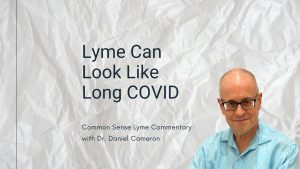Call for your appointment today 914-666-4665 | Mt. Kisco, New York

by Daniel J. Cameron, MD MPH
The case report describes an uncommon adverse drug reaction which occurred in a 45-year-old woman who was prescribed antibiotics for Lyme disease and Babesia. Following her diagnosis, the patient received three months of treatment which included doxycycline, minocycline, and trimethoprim-sulfamethoxazole.
According to the authors, the patient’s “clinical presentation was most consistent with the syndrome of drug reaction with eosinophilia and systemic symptoms (DRESS), likely secondary to one of the many antibiotics she had been exposed to.” DRESS is a rare adverse event that can occur after antibiotic therapy.
 The authors dismissed the knowledge and experience of the treating doctor. “She sought care from a ‘Lyme-literate doctor,’ a term used by certain physicians who prescribe prolonged antibiotic courses to treat chronic Lyme and other tick-borne diseases.”
The authors dismissed the knowledge and experience of the treating doctor. “She sought care from a ‘Lyme-literate doctor,’ a term used by certain physicians who prescribe prolonged antibiotic courses to treat chronic Lyme and other tick-borne diseases.”
The authors did not address the diagnostic difficulties doctors face when clinical presentations overlap. “Her medical history was significant for multiple transient and ill-defined neurologic and gastrointestinal complaints for which she had sought numerous medical opinions without a satisfactory diagnosis,” states Marks from the Perelman School of Medicine, University of Pennsylvania.
Furthermore, Marks and colleagues failed to mention the challenges doctors face in diagnosing complex cases in the absence of a reliable laboratory test. Instead, they questioned the reliability of a specialty lab for tick-borne diseases. The authors relied on an autoimmune and infectious workup, repeated Lyme enzyme immunoassay, Babesia antibody testing, and blood smear without questioning the reliability of their lab. Nor did the authors address the poor reliability of current tests, such as the well-known two-tier test. Molins from the Centers for Disease Control and Prevention has found the “existing two-tier serology-based assays yield low sensitivities (29 – 40%) for early infection.” [2]
The authors did not address the risks of not treating a tick-borne illness. One study found that more than half of the patients treated with a 3-week course of antibiotics for an erythema migrans rash remained ill at 6 or 12-month follow-up. [3] Fourteen percent of LD patients treated at the time of an erythema migrans rash developed Post-Treatment LD over the course of a decade or more of follow-up. [4] Chronic neurologic disease [5] and Lyme encephalopathy [6, 7] have also been described despite antibiotic treatment.
The authors did not address the potential benefits of treatment. Longer-term antibiotics and treatment for Babesia have been recommended, according to one set of evidence-based guidelines. [8] Longer-term treatment has been opposed in other guidelines. [9] Babesia treatment was recommended in the opposing guideline. [9] The authors cited poor outcomes in several clinical trials to oppose treatment without explaining that those subjects had already failed treatment and were ill an average of 2.9 to 9 years, without evidence of a co-infection with Babesia. [7, 10, 11]
The authors did not address the paucity of evidence for their recommendations. “Some patients respond to psychotherapy, cognitive behavioral therapy, graded exercise regimens, or antidepressants, and clinicians should advocate these safe and evidence-based treatments.” [1] The authors cited a 2007 review paper of functional somatic syndromes rather than trial evidence. [12] Finally, the authors did not discuss whether psychotherapy, cognitive behavioral therapy, graded exercise regimens, or antidepressant were prescribed and if they were effective.
References:
1. Marks, C.M., J.E. Nawn, and J.A. Caplow, Antibiotic Treatment for Chronic Lyme Disease-Say No to the DRESS. JAMA Intern Med, 2016.
2. Molins, C.R., et al., Development of a metabolic biosignature for detection of early Lyme disease. Clin Infect Dis, 2015. 60(12): p. 1767-75.
3. Aucott, J.N., et al., CCL19 as a Chemokine Risk Factor for Post-Treatment Lyme Disease Syndrome: A Prospective Clinical Cohort Study. Clin Vaccine Immunol, 2016.
4. Weitzner, E., P. Visintainer, and G.P. Wormser, Comparison of males versus females with culture-confirmed early Lyme disease at presentation and at 11-20 years after diagnosis. Diagn Microbiol Infect Dis, 2016.
5. Logigian, E.L., R.F. Kaplan, and A.C. Steere, Chronic neurologic manifestations of Lyme disease. N Engl J Med, 1990. 323(21): p. 1438-44.
6. Logigian, E.L., R.F. Kaplan, and A.C. Steere, Successful treatment of Lyme encephalopathy with intravenous ceftriaxone. J Infect Dis, 1999. 180(2): p. 377-83.
7. Fallon, B.A., et al., A randomized, placebo-controlled trial of repeated IV antibiotic therapy for Lyme encephalopathy. Neurology, 2008. 70(13): p. 992-1003.
8. Cameron, D.J., L.B. Johnson, and E.L. Maloney, Evidence assessments and guideline recommendations in Lyme disease: the clinical management of known tick bites, erythema migrans rashes and persistent disease. Expert Rev Anti Infect Ther, 2014: p. 1-33.
9. Wormser, G.P., et al., The clinical assessment, treatment, and prevention of lyme disease, human granulocytic anaplasmosis, and babesiosis: clinical practice guidelines by the Infectious Diseases Society of America. Clin Infect Dis, 2006. 43(9): p. 1089-134.
10. Berende, A., et al., Randomized Trial of Longer-Term Therapy for Symptoms Attributed to Lyme Disease. N Engl J Med, 2016. 374(13): p. 1209-20.
11. Klempner, M.S., et al., Two controlled trials of antibiotic treatment in patients with persistent symptoms and a history of Lyme disease. N Engl J Med, 2001. 345(2): p. 85-92.
12. Henningsen, P., S. Zipfel, and W. Herzog, Management of functional somatic syndromes. Lancet, 2007. 369(9565): p. 946-55.



